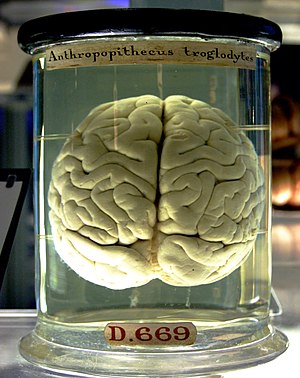
Image via Wikipedia
But even after decades of intensive research and inquiry - and centuries of dissection and speculation - the brain remains an enigma in many ways.Scientists are adopting a variety of new approaches to untangle the brain's secrets, though. Researchers at IBM are constructing a supercomputer simulation of the neocortex so detailed as to include every single neuron. Scientists at UC San Diego are painstakingly dissecting the brain of the late H.M., the famed amnesiac who participated in hundreds of memory studies, and attempting to create a "Google earth-for-brains" from his brain topology. From The New York Times:
Advanced computer technology tracks and digitally reproduces each slice [of H.M.'s brain]. An entire brain produces some 2,500 slices, and the amount of information in each one, once microscopic detail is added, will fill about a terabyte of computer storage. Computers at U.C.S.D. are now fitting all those pieces together for Mr. Molaison's brain, to create what Dr. Annese calls a "Google Earthlike search engine," the first entirely reconstructed, whole-brain atlas available to anyone who wants to log on.
"We're going to get the kind of resolution, all the way down to the level of single cells, that we have not had widely available before," said Donna Simmons, a visiting scholar at the Brain Architecture Center at the University of Southern California. The thin whole-brain slicing "will allow much better opportunities to study the connection between cells, the circuits themselves, which we have so much more to learn about."
Approaching from another angle, psychologist Dr. Russel T. Hurlburt is trying to understand the brain and the process of consciousness by creating instantaneous mental snapshots of subjects. The advanced technology he's employing to create these snapshots? Description.
Dr. Hurlburt, 64, presents the case of Melanie, a young woman who was fitted with a beeper that randomly prompted her to record everything in her awareness several times a day. In later interviews, she reconstructed these moments, often under rigorous cross-examination.
The resulting mental freeze-frames are remarkably diverse.
On the third day of Melanie's experiment, as her boyfriend was asking her a question about insurance, she was trying to remember the word "periodontist." On the fourth day, she was having a strong urge to go scuba diving. On the sixth day, she was picking flower petals from the sink while hearing echoes of the phrase "nice long time" in her head.
Whether or not these efforts will lead to valuable conclusions or advances in understanding, I can't say, but they are certainly interesting projects. In light of the year 2000 predictions about 2010, I can't help but wonder what we'll know about the brain in 2020.

![Reblog this post [with Zemanta]](http://img.zemanta.com/reblog_e.png?x-id=1ef83179-1507-4dd0-bd95-f79fbd4ff428)
Leave a comment: